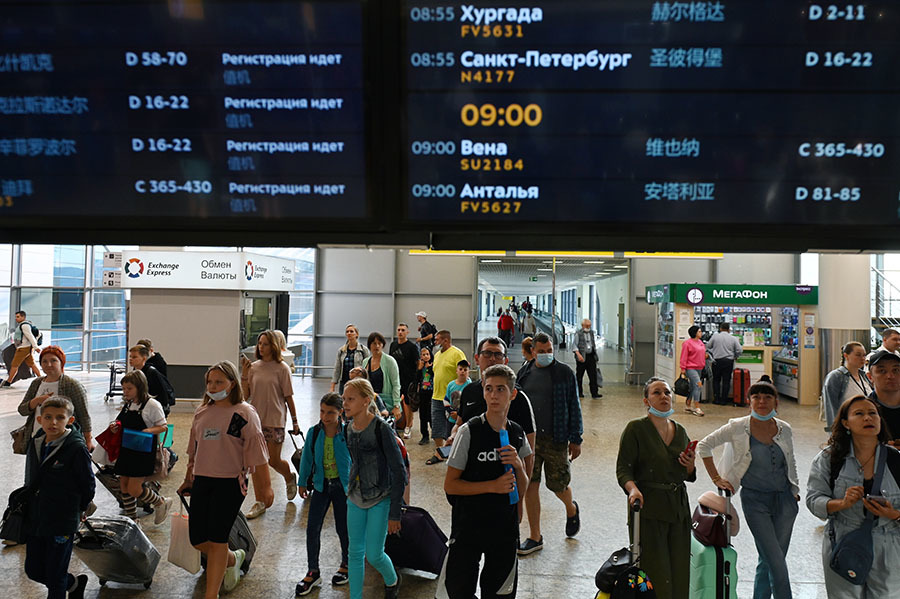In Russia, by 2024, they plan to introduce biometric scanners to pay for fares in all types of public transport.
This was told by the head of the Ministry of Transport of the Russian Federation Vitaly Savelyev, speaking at the marathon "New Knowledge".
“We are going by 2024 in Russia to create an opportunity for biometrics, as with a passport, you will use in all public modes of transport.
They will scan your face, read money, they will recognize that it is you, ”the minister said.
Savelyev added that an automated passport border control system operates in Terminal C of Sheremetyevo Airport, opened in July 2021: "This is already reality."
The head of the analytical department of AMarkets Artyom Deev, in an interview with RT, noted that in the issue of the introduction and use of biometric data, Russia is moving in a general trend with the whole world. According to him, now in the most developed regions of Europe, Asia and America, similar technologies are used, when, according to the scanned image of a face, people have access to public transport, and also pass passport control at airports and on the railway.
“This is undoubtedly convenient for passengers, as it allows them to quickly go to the waiting rooms or to the control, without providing an additional passport.
Biometrics works as an additional checkpoint, without unnecessary employees, without delays and loss of time.
All checks (on the person's face) are carried out by automation.
And for busy transport hubs (airports, railway stations), this technology unloads traffic, does not create conditions for queues and crowds to appear, "Deev explained.
Sheremetyevo airport
RIA News
© Maxim Blinov
Speaking about the safety of using such technologies, the expert recalled that, according to the legislation of the Russian Federation, the biometric data of citizens are protected.
In addition, Deev stated that it is almost impossible to falsify the image of another person's face, so there are practically no risks for personal data.
Denis Kuskov, general director of the information and analytical agency TelecomDaily, called the Face ID system one of the most reliable and widely used on many devices: "In the future, it will only improve in terms of reliability."
In turn, Ksenia Artemyeva, COO of the Fast River fintech platform, noted that the biometrics fare payment system may be convenient for users as well, since it will not only save time to complete a transaction, but also allow it to be completed even if phone and wallet stayed at home.
The interlocutor of RT suggested that the success of the implementation of this technology could help spread the technology of identification by biometrics more widely.
“First, to prove the effectiveness of the regulator so that in the future it will become realistic to use identification in banking, as well as remove user skepticism, so that the level of confidence in biometrics will grow among the population, who are still reluctant to hand over biometric data,” said Artemyeva.
Note that the possibility of using biometrics was mentioned in the industry's Digital Transformation Strategy, the work on which was announced by the Ministry of Transport in July.
The message said that by 2030, transport passengers "will receive digital profiles, forget about the need for paper documents, use biometrics to pay for travel and quickly go through security checks at airports and train stations."
Also on russian.rt.com The Ministry of Digital Science told about the details of digitalization of state-owned companies
Vladimir Putin ordered to develop the corresponding document at the end of 2020.
The head of state instructed to create a Digital Transformation Strategy for at least ten sectors of the economy, social sphere and public administration.
As noted in the document, this is necessary to achieve “digital maturity” of industries.
Six key initiatives of the Ministry were considered in the strategy of the Ministry of Transport: "Unmanned aerial vehicles for passengers and cargo", "Green digital passenger corridor", "Seamless cargo logistics", "Digital management of the transport system of the Russian Federation", "Digitalization for transport security" and "Digital twins of objects transport infrastructure ".
The implementation of the strategy is based on the priority use of domestic software and the massive use of artificial intelligence technology.
“By 2030, the ministry's set of initiatives will ensure the commercial use of drones in all modes of transport for the transport of passengers and goods.
At the same time, domestic and foreign autonomous trucks will deliver goods between Asia and Europe through Russia.
In addition to increasing the speed of transportation, reducing the cost of transport and logistics services, the implementation of the strategy will reduce the number of fatalities in road accidents by 8% through the use of unmanned vehicles, ”the release said.
The Ministry of Transport also assumes that the safety, reliability and continuity of the operation of transport infrastructure facilities will be controlled using "digital twins", and artificial intelligence technologies will be used to model traffic flows.

